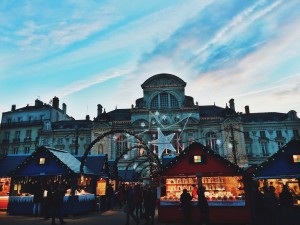“It always seems impossible until it’s done” (Nelson Mandela)
^Applicable to finishing these blogs as well as combatting climate change
Je Ne Sais Quoi
Je ne sais quoi translates to a quality that cannot be described or named easily. Reflecting upon the last month of data collection and analyses into Global Health while traveling I’ve come to the conclusion- there is not one single answer when it comes to the correct approach health. In other words, je ne sais quoi. In France, they preach moderation of foods such as bread and cheese with a exercise regimen of walking daily, in Spain there is an all inclusive diet of carbs, fruits, vegetables, legumes, etc… and gyms are far more frequented. Being in Angers for an extended amount of time, I’ve experienced firsthand that smaller European towns are not as affected by Industrialization of the food industry. Angers especially local markets sourcing seasonal foods-
“farmers sacrifice quality and diversity for quantity by focusing their efforts on just a few staple crops with high yields. It is likely that more than 50% of the calories you consume today derived from rice, corn, wheat, or potatoes.” (Lieberman 2013)
Of course, smaller countries with much older traditions have an easier time urbanizing cities where they can source local foods and hold weekly markets with fresh meats. In contrast, America is so widespread, disregarding places like NYC, it’s definitely more of a challenge. In addition to the food industry, each place I’ve visited faces daily unseen threats that are a direct result of industrialization or tourism. In Spain they’re facing noise pollution to levels that are seen as a threat to the population’s foreseeable health! That is a unique issue present in a very select amount of places.
London Calling/Scotland in less than a Day
My last journey was to travel to London for three days and then flying to Scotland Sunday Morning to visit one of my friends and then leaving the following morning…In the brief time I spent in London I experienced air pollution that is recorded to be the worst in the EU/UK. Environment commissioner Janez Potočnik rehashed the fact that “air pollution is bad for our health. It reduces human life expectancy by more than eight months on average and by more than two years in the most polluted cities and regions,” so in London citizens are facing a loss of 2+ years due to pollution levels thanks to increased traffic being a global tourist destination. And for good reason, besides the fog forever hanging in the air. Personally I prefer the tea London fog to its actual counterpart.
The other thing I noticed in London that stood out was the usage of dairy products specifically cow based. Which I found odd due to the fact Europe has established regulations against excessive production of cow milk-
this change had actually started back in 1984 when the European Community established quotas on cow milk that pushed Dutch farmers away from dairy cattle. Many continued as dairymen but started milking goats.” (Quammen 2012)
Staple food products in London include:
-Yorkshire pudding, made from flour, eggs and milk, is a sort of batter baked in the oven and usually moistened with gravy.
-Fish (which can be either cod, haddock, huss, or plaice) deep fried in flour batter with chips (fried potatoes) dressed in malt vinegar.
^This is England’s most common “to-go” food. Fish and chips are not normally a home cooked dish but bought at a fish and chip shop to eat on premises or to take with you elsewhere.
All of the above staple food items (that are also common across the UK) include dairy products that according to Spillover’s author David Quammen, we are not physiologically made to be consuming at the scale that we do. There are many other researchers as well as animal rights activists that have proved that we are physically not evolved to be meat eaters or consuming animal products.
Our anatomy and physiology are those of natural plant-eaters. Human canine teeth are small and blunt, and we have flat molars for grinding up plant fibers.” (Towell 2009)
Continuation of Workout Culture Study/Independent Research
In my previous blog I said I would further examine workout culture by speaking with students in UCO with a French background as well as seeking out ordinary Angers citizens to further develop an emic perspective, and this being a far more informal data collection, I will reflect upon the contrasts in this final blog. Finalizing my project reflecting upon variances in workout culture, I wanted to relate that back to health on a grander scale.
Questions I asked to First Year in France Students:
1. What do you think the definition of health is?
2. Do you think a healthy lifestyle includes working out?
3. Do you workout outside of daily transportation necessities of walking?
I got a variety of answers, but the common string among all answers was that health included not only bodily health but psychological health. In every single person I interviewed they mentioned health was inclusive of keeping a healthy mind and not being too stressed. This was something that I never thought about before this stage of research. Contracting and being susceptible diseases does depend on the strength of your immune system which can be influenced by stress. I suppose my conclusive thoughts on what I’ve heard and gathered information on is that there is definitely a separation of thought, a culture difference, and different actions being taken in the U.S. and France when it comes to being healthy. Working out is not as emphasized in France, while taking care of your mind just as much as your body is not emphasized in the U.S.. Is there a superior lifestyle? No, I don’t think one is far better, but taking lessons from both these separate places and seeing what works on an individual level is what I’m going to do.
COP21 and Final Thoughts
This week in Paris there was a Climate Change Conference being carried out that could be declared one of the most important conferences in the history of global meetings. The rallying cry of the conference was the very catchy slogan “1.5 to stay alive!” One of the most vital meetings during this conference is the discussion of de-carbonising the world’s energy supply and-
Exploring the increasing role of renewable energy technologies on low carbon development, and how new technologies and grid infrastructure can increase climate change resilience” (COP21)
Important points of discussion that will be mulled over during the week of December 3rd-11th include: Carbon Pricing & Markets- further embarking on the usage of low-carbon technologies is no longer a luxury to maybe consider, our carbon emissions are sending the world into jeopardy. Yes all this may sound dramatic or exaggerated, but statistics would beg to differ. And lack of news coverage in the U.S. has kept us in the dark about a lot of these issues. Okay, back to the topics that will be discussed and drawn upon to create an action plan:
“Exploring the role of private sector innovation and investment in developing sustainable urban environments”
“Exploring the increasing role of renewable energy technologies on low carbon development, and how new technologies and grid infrastructure can increase climate change resilience”
“Discussing innovative new processes and technologies to reduce the environmental impact of private sector operations”
Carbon emissions contribute and are the biggest greenhouse gas that is emitted through our activities such as combustion of fossil fuels (coal, natural gas, and oil) and used in energy and transportation- nice going humans.
I’ve generally been a pretty health-conscious human being on an individual scale. Before this semester I had little to no knowledge about global health issues and pandemics- how they started, how they’re spread, and why we don’t act sooner. Now, thanks to my classes, France and it’s alternate perspective, as well as interesting reads such as Spillover by David Quammen am I far more aware and tuned into these issues that are relevant to our time. This class has taught me if anything- the fragility of human lives, but how to live courageously in spite of all risks. Every time you enter your car you’re risking your life, but you continue to drive. Life is unsure and unstable, but we can only inform ourselves and move forwards.
Sources Cited:
Quammen, David. Spillover: Animal Infections and the next Human Pandemic. New York: W.W. Norton, 2012. Print.
“Find out More about COP21.” UNFCCC COP 21 Paris France. N.p., n.d. Web. Dec. 2015.
“Overview of Greenhouse Gases.” Carbon Dioxide Emissions. N.p., n.d. Web. Dec. 2015.
Vidal, John. “London Air Pollution ‘worst in Europe'” The Guardian. Guardian, n.d. Web.
Green, Jared. “Uniting the Built & Natural Environments.” Dirt. ASLA, n.d. Web.
“Pollution Control at the Local and Global Levels.” Pollution Control at the Local and Global Levels. University of Michigan, 2001. Web. 12 Dec. 2015.
Lieberman, Daniel. The Story of the Human Body: Evolution, Health, and Disease. N.p.: n.p., n.d. Print.
http://prime.peta.org/2009/10/yes-its-true-humans-arent-meant-to-eat-meat

